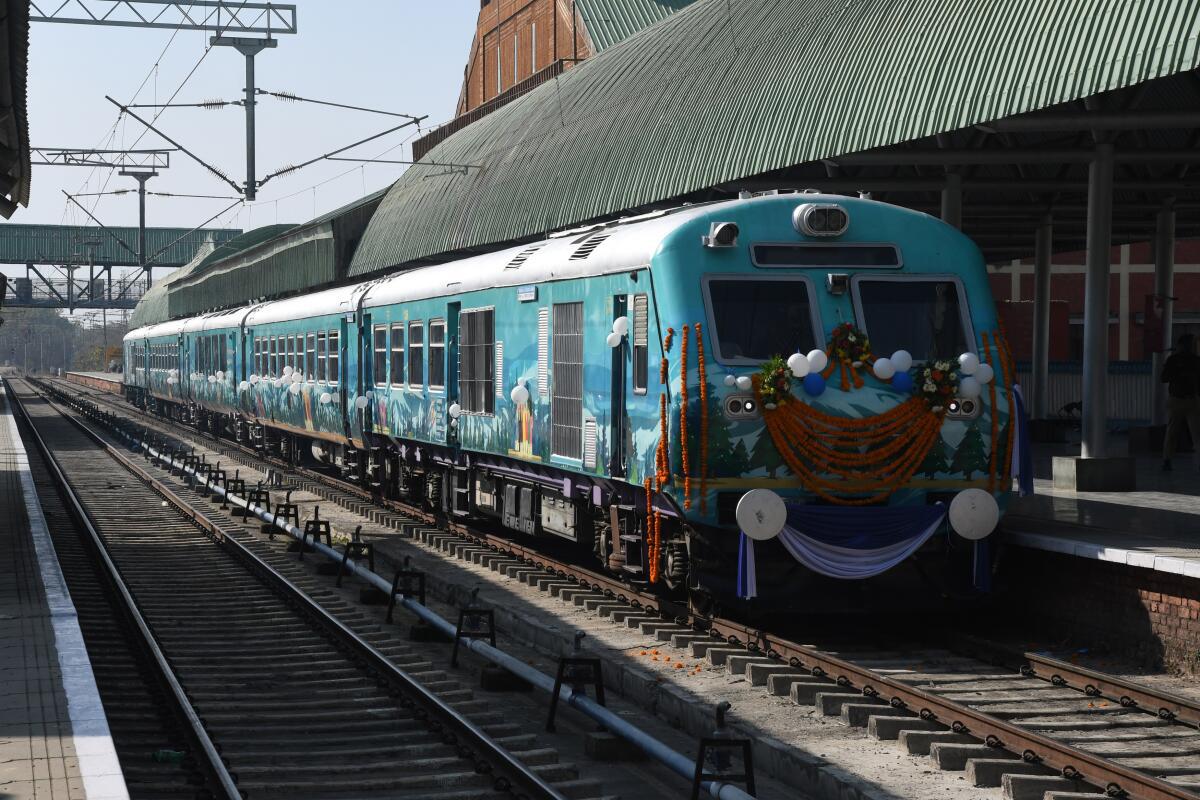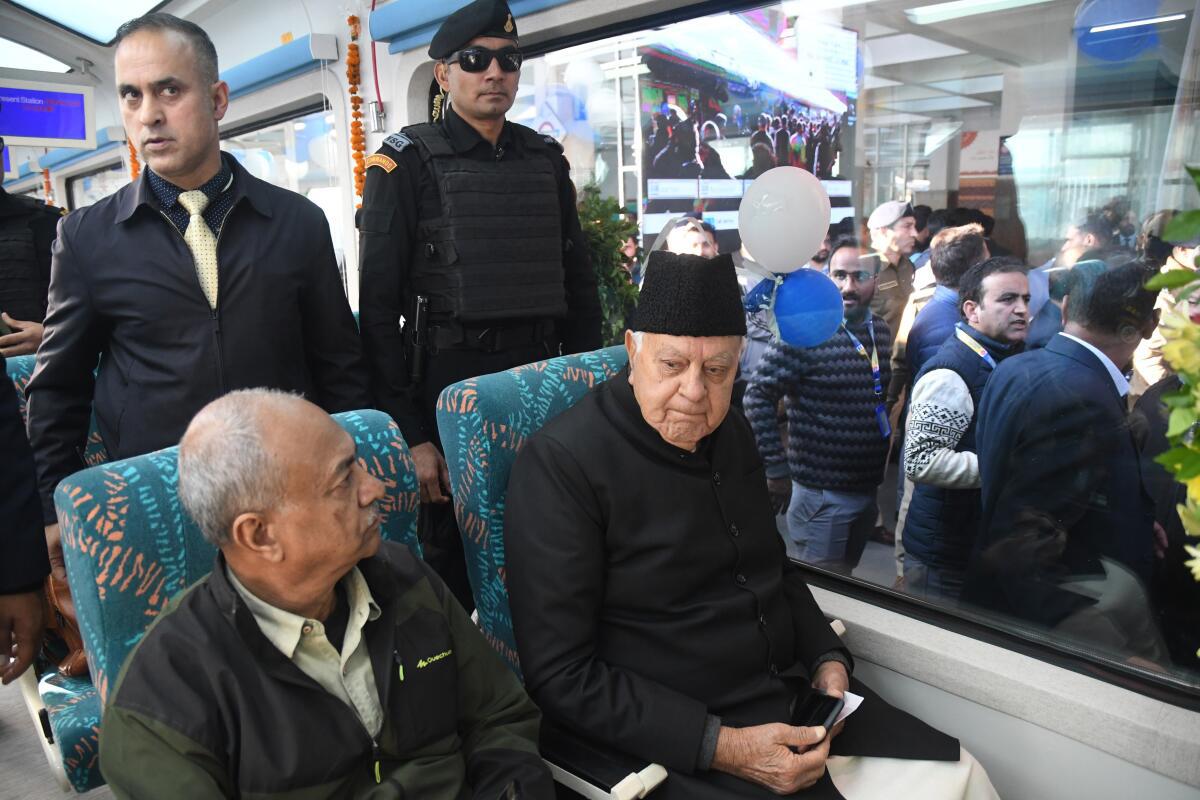
The new vistadome coaches in Kashmir’s sky trains
| Photo Credit: Nissar Ahmad
The autumn sun lights up the 40-seater vistadome coaches introduced this month on trains plying in the Kashmir valley. The glass roofs give you a glimpse of the sky, which will soon be filled with swirling snowflakes as winter approaches, making the ride even more breathtaking. For romantics who would travel to Switzerland to recreate the train scenes from the 1995 blockbuster, Dilwale DulhaniaLe Jayenge, Kashmir has set a perfect stage this winter.
The exteriors of the coaches, however, have a local touch — in summer blue with Kashmiri women in traditional winter outfits, depicting the dance, roaf, popular during weddings in the State. These coaches will open a new chapter for tourism in Kashmir. “Tourists will get a visual experience of rural Kashmir, its orchards and fields,” says Nasir Shah, chairman of Kashmir Leisure and Pilgrimage Tour Operators. They have been added on the Srinagar-Banihal leg and come equipped with inbuilt GPS-based information systems. Banihal town is the gateway of Kashmir and connects the Valley through the Jawahar Tunnel. The train passes through the Banihal-Qazigund Railway Tunnel, which is 11.2 kilometres long, cutting through the Himalayas. The Banihal stretch, which was constructed as an alternative cart road by Dogra kings in the 1920s, is set to become a railway track, too.

The train with the new vistadome coaches pulling into the station
| Photo Credit:
Nissar Ahmad
Of saffron dunes and shrines
As you begin the journey, which takes around two hours, the full glass windows give you a panoramic view of the famous saffron dunes of Pampore in Pulwama. On a clear day, the snow-capped Pir Panjal Range, a chain of mountains in the Lesser Himalayan region, is visible. Orchards go by as the train chugs over the Sangam bridge towards Anantnag. The vista then morphs into rice fields.

When the sun gets harsh, an electrically-controlled opalescence shades the roof. The stopover in Pulwama and Qazigund takes you close to two prominent shrines of Syed Fareed-ud-Din and Mir Syed Mohammed Hussain Simnani. Saint Simnani, from Iran’s Sinman area, arrived in Kashmir in the 14th century along with saint Mir Syed Ali Hamadani to propagate Islam.
The train also passes by piles of willow blocks being seasoned in the autumn sun before being chiselled into the finest bats. For Jammu and Kashmir, which hosted 1.88 crore tourists this year, the train will be another memorable experience for visitors after the must-do shikara rides on the Dal lake in Srinagar.

Of saffron dunes and shrines
Farooq Abdullah, the former Jammu and Kashmir chief minister, says he is waiting for the first snowfall in the plains this year. “I am eager to take a ride when it snows to experience the beauty of Kashmir. I want to check if the coach maintains the temperature during the winter, too,” says Abdullah, who hopes the ride is affordable for ordinary people, especially when the road to Kashmir remains blocked due to inclement weather. Saqib Yousuf Yatoo, chief area manager, Indian Railways, confirms that the fare would be ₹930 in the stretch.

Former Jammu and Kashmir chief minister Farooq Abdullah inside one of the new coaches in Srinagar
| Photo Credit:
Nissar Ahmad
The coach, designed and developed by the Indian Railways’ Integral Coach Factory, Chennai, offers rare comfort to commuters. “Besides a larger viewing area, including a glass roof, the seats rotate 180 degrees,” says Yatoo. This allows families and friends to face each other during the ride. Automatic doors ensure warm temperatures inside, even as the mercury dips to sub-zero degrees outside.
There is also an entertainment system with screens and speakers. The addition of a sunk-in LED destination board will make it easier for passengers to get off the train easily.

Expansion plans
The coach service is likely to be extended to north Kashmir from Srinagar. “The expansion plan is under discussion,” says Yatoo.
The coach has been introduced amid the Indian Railways’ expansions of its network in Kashmir, for the first time since 1947. Kupwara, which is close to the Line of Control, has been surveyed for a rail network. According to the Indian Railways, Vande Bharat trains, connecting Jammu with Srinagar, are scheduled to begin operations in 2024.
From a 96 km rail length in 2003, mainly in the plains of Jammu, the rail network expanded to 298 km in the State in 2021. The ambitious rail link connecting Jammu’s Katra with Banihal near the Valley will cover a distance of 111 km. Some 27 tunnels and 37 bridges will make the Kashmir valley a part of the mainland railway network. The train will stop in places as far off as Baramulla and Kupwara in north Kashmir, widening experiences for the intrepid traveller.






